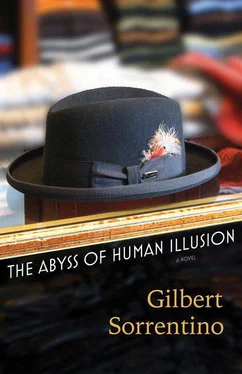One morning, working fitfully on a story that he knew was not going to be any good, and that each gluey additional phrase made more awkward and unwieldy, and, worse, egregiously literary and important, the old writer put his pen down and lit a cigarette, although he had just about completely given up smoking; he had no idea why — oh, to live longer and with zest and verve, and to make happy the health corps.
He was tired, very tired, and too old and immovably marginalized for the story to make any difference to his life: what he had come to, in his mid-seventies, he had come to. He was respected, yes, he had known and been friends with many famous writers and artists, right, he had won a prize here, an award there, sure, odds and ends of distracted attention on the part of the fame machine. His current publisher, a kind of career “literary person,” had started his self-important little house with a young woman of very substantial means and a deep love of literature, of course. Their office “suite” was in Yonkers, magically transmuted to Bronxville on their letterhead. Yonkers/Bronxville was less than an hour from the city, so they could keep up (as they said) with things, yet it was quiet and relaxed, removed from the publishing frenzy (as they said) of New York. So they said and said again while they published salutary but soporific books of what one and all agreed was true literary merit. The publisher had spent his life so far working as an editor at two or three of the big mills, and had been responsible for many books of literary merit by many a spear carrier, some of whom had made back their wishful-thinking advances. But now he was an independent publisher, backed by his partner’s and, it should be known, lover’s money. He had left his unhappy wife and spoiled, unhappy children, who were, of course, really bright, for her. She understood him and his needs and hopes. The song goes on.
The new house, eponymously Solomon & Sorel, published, it so turned out, the same sorts of books for which he had been responsible in the frenzied world of Publishing, Inc. They were respectable, they did no harm, they exhibited to a degree the shopworn tropes and humanistic razzmatazz beloved of reviewers (“as if we have lived with these confused characters through their so-human travails,” etc.), and they were much like the bunk published by the latest thirty-year-old genius with the fresh eye and astonishing grasp, the one who makes us look anew at literature, but they were, to the chagrin of S&S, destined for the great void. Perhaps soon they’d luck out, although this phrase in its vulgar candor, was not used.
The house — Solomon was the publisher, Sorel the wealthy lover named, in exchange for the rent, “editor-in-chief”—picked up on the old writer, who is as we know currently smoking; they told him that if he didn’t have a current publisher — this was but a courtesy comment — S&S would be honored to be his outlet; he was marvelously this and courageous that and unfairly the other thing and tra la la la la. S&S (known already, cruelly, as So-So House) offered him an advance that would, he calculated cynically, cover his rent for not quite two months, an amount so modest, as they had no shame in saying, that it seemed to be a kind of honorarium presented him for being alive.
So they would publish the novel that had been rejected thirty-seven times, and after the novel, a collection of his short stories: with four or five new ones added to the twenty or so he’d published in his lifetime, they’d have a very attractive book, their phrase. The writer agreed, although he knew that he had very little creative juice left. His good early work was all o.p., and when he looked at it, he couldn’t recognize any of it as his. His energy had been left in bars and beds, in quarrels and envies, in bitter disappointments. He was written out, and knew it.
Solomon, and Sorel, too, for that matter, presented, over lunch with him, their notions of the possibilities that these two new books would open — he might well, finally, be recognized for the master that he was. The old writer listened and smiled, the hot air blowing about him at the table. He knew that his novel would silently appear and slowly disappear; his stories would barely appear and quickly disappear, and Solomon and Sorel would soon discover that he was not quite pleasant enough, not nearly as enthusiastic as he, well, should have been, and then decide that their relationship with him was not all that it should be. So that would be that; the old writer could see all this with ferocious clarity.
But he wrote on, and would write on, bored with his work, bored with himself, bored with pure Solomon and breathless Sorel, bored with the very idea that any of this meant anything at all to anyone at all. Solomon had said that he was hopeful that his “Village novel,” as he called Jaunty Jolly, might be nominated for one of the more prestigious prizes, the PEN/Faulkner, perhaps? It was about time. Perhaps the NBA? Why not?
The old writer put the yellow legal pad he’d been writing on into a fresh file folder, on which he wrote Stories. He’d look at the story tomorrow, although he didn’t want to look at words any more, especially his own. But he would, he would. He should have stopped this foolishness years ago, but he didn’t know what else to do and he was not quite ready to disappear into dead silence. Not with the PEN/Faulkner waiting! He was almost amused.
THE PARK
Donnie had gone in to San Antonio with two other soldiers from his advanced training company in Fort Sam Houston’s Medical Field Service School. After hours of drinking in one dump after another, and the boisterous, aimless wandering in search of shabby adventure that is the soldier’s substitute for leisure, he somehow lost his companions, or they him. He wandered around in the vicinity of the Alamo, and then “found himself,” almost literally, on a bench in the middle of a little park, broke and stupid drunk. He hoped that an M.P. or A.P. patrol wouldn’t find him, for he was their perfect catch; and he knew, too, that a city cop would be all too happy to arrest him, one of the flood of vermin that daily spoiled the city. His “civilian” clothes of khakis, low-quarters, and a hideously figured shirt — an AWOL shirt, as it was known — would fool nobody: he was most clearly a soldier and a drunken bum. So he sat, breathing deeply, and looking around nervously and fatalistically: he was drunk and broke in the middle of the San Antonio night; what else was there to say? He thought, absurdly, that if he could manage to walk without staggering, he might be able to get to the bus depot, which was, he was certain, not too far; there, he could look like any other dumb soldier waiting to get back to Fort Sam. He had no money, but the main thing now was for him to get off the street.
A man, perhaps five years older than he, was quite suddenly standing in front of him, and he waited to hear the cold command, “Stand up, soldier,” but instead heard the man saying that the M.P.’s were due on their rounds through the park any minute and he’d be pinched for sure. Did he have any place to go for the night? He had no place to go, no; no place to go.
THE HOTEL
The man lived or was staying in a room at the Cactus Hotel, an old frame building of three floors on the edge of the West Side, the Mexican district. The place was bleak but clean, as was the room that they entered on the top floor. The mended sheets looked as if they’d been changed recently, and two paper-thin towels on door hooks were not noticeably soiled. There was a bathroom in the hall that served the three or four guests, so to speak, who lived on the floor. He stripped to his briefs and T-shirt in the bathroom, washed with a cake of Lifebuoy that the man had given him, and dried himself with one of the towels, which had a faint aroma of Aqua Velva. When he got back to the room, the man was in bed and apparently asleep. Sitting at the side of the bed was a small fat man with thick-lensed glasses, wearing a dirty, wrinkled suit and a gray fedora with a ridiculously wide brim. He was talking, rather urgently, to the man in the bed about a movie that, he remembered, had to do with a gangster who had a recurring nightmare about being lost in a rainstorm, a white rainstorm, yeah, he was crazy. The man in the bed made no reply. “Do you remember Kay Francis?” he said to Donnie. “She had a little lisp. There’s a woman whose ass I’d like to fuck.” Donnie smiled faintly and got into bed and the fat man asked to look at his feet, and Donnie, although he had no idea why, stuck his legs out. The man examined each toe, then carefully and lovingly licked his soles. Donnie lay there, oddly pleased, amused even, and then the fat man got up and as he turned to leave, said “Kay Francis,” and stroked his crotch. The whole scene seemed absolutely natural and even banal. This was the sort of thing that happened at the Cactus Hotel, certainly. Donnie got under the sheet and turned out the shadeless lamp at the side of the bed, then lay, staring awake, after a time realizing, although he didn’t want to realize it, that he was sexually aroused, that he wanted the man next to him to turn and reach over and touch him, kiss him, do whatever he wanted. What was the matter with him? Two weeks earlier he had fucked three whores in Nuevo Laredo, he certainly wasn’t a fag! But he wanted the man to reach over and touch him, touch him, and ask him to do things with him. He turned on his side, his face burning with shame and lust. He knew the man was awake and aware of his desires, and knew, too, that all he had to do was make the first move. He lay rigid, astonished and revolted by his erection.
Читать дальше












